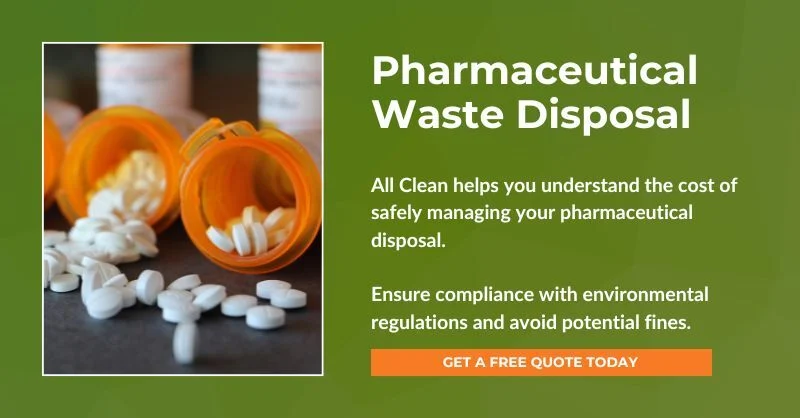
Why Pharmaceutical Waste Disposal Requires Special Handling
Even well-established pharmaceutical companies with years of experience can sometimes overlook fundamental safety protocols when handling hazardous waste.
A Rancho Cordova chemical facility is an example of how that oversight can lead to serious legal consequences. A few years ago, the U.S. Environmental Protection Agency settled with the pharmaceutical manufacturing facility, Ampac Fine Chemicals LLC, which agreed to pay nearly $70,000 in fines. The EPA determined that the company failed to improperly label hazardous waste containers and did not separate incompatible hazardous waste during accumulation, among other violations.
Your business doesn’t have to be a pharmaceutical manufacturing facility to generate pharmaceutical waste. Hospitals, clinics, pharmacies and even veterinary offices routinely handle medications that require proper disposal to comply with regulations.
Chances are, your facility generates several other waste streams as well, from electronic waste to other types of medical waste. How your organization handles pharmaceutical waste disposal can impact not only regulatory compliance but also environmental safety and your business’s reputation.
Here are three reasons why pharmaceutical waste disposal requires special handling:
- Pharmaceutical waste can have hazardous chemical composition.
- Improper disposal can lead to antibiotic-resistant bacteria in the environment.
- Waste transporters must be specially certified.
Hazardous Chemical Composition
Many pharmaceuticals contain active ingredients that are classified as hazardous waste under environmental regulations. These substances may be toxic, flammable, corrosive or reactive, meaning improper disposal can pose serious risks to both human health and the environment.
For example, chemotherapy drugs, some antibiotics and certain hormonal medications can be particularly harmful if they enter water systems or leach into the soil. Even in small amounts, these chemicals can disrupt ecosystems, harm aquatic life and pose risks to public health.

Some pharmaceuticals also can create dangerous chemical reactions when mixed with other waste materials. Incompatible substances can lead to fires, explosions or the release of toxic fumes if not handled properly.
Antibiotic-resistant Bacteria in the Environment
One of the growing concerns surrounding pharmaceutical waste disposal is the potential for contributing to antibiotic resistance. When antibiotics are disposed of improperly, such as being flushed down the drain or thrown in the trash, they can enter wastewater systems and the environment. This is known as antibiotic pollution.
These residual antibiotics may then promote the survival of resistant bacteria, which can spread through water sources, soil and even into the food chain. Over time, this exposure accelerates the development of antibiotic-resistant bacteria, making it harder to treat infections in both humans and animals.
Wastewater treatment plants are not always equipped to fully remove pharmaceutical compounds, meaning that even trace amounts of antibiotics can persist in rivers, lakes and drinking water supplies.
This contributes to what the World Health Organization (WHO) has identified as a global health crisis, where once-treatable infections become more difficult, if not impossible, to control. Proper pharmaceutical waste disposal, including the use of designated take-back programs and high-temperature incineration, helps mitigate this risk and prevent the spread of resistance.
Pharmaceutical Waste Transporter Licenses
While hazardous waste disposal companies can often transport several waste streams, it’s important to check whether your disposal partner is licensed to dispose of pharmaceutical waste.
Depending on the type of pharmaceutical waste that requires disposal, you must work with a regulated medical waste transporter or a hazardous waste transporter. However, there are several types of pharmaceutical waste, and several types of waste streams that likely come out of your business.
For example, any kind of infectious waste, pathological waste and sharps waste must be disposed of by a regulated medical waste transporter, while radioactive waste must be disposed of by a specialized hazardous waste transporter. Pharmaceutical trace waste may be disposed of by a regulated medical waste transporter or a hazardous waste transporter, depending on the type of pharmaceutical.
If your pharmacy has electronic waste to dispose of, that must be handled by a universal waste transporter. Solid waste - contaminated packaging or nonhazardous materials, for example - is handled on a case-by-case basis, depending on the type of solid waste that requires disposal.
Knowing which transporter can handle the type of medical waste your facility generates can be challenging. Adding to the confusion, there are few facilities in the pharmaceutical industry that only produce one or two waste streams. Your company will likely generate multiple waste streams that fall into various categories.
When looking for a waste transporter partner, it can be helpful to look for a hazardous waste disposal company that can meet the requirements of all of your waste so you don’t have to hire multiple partners.
Proper pharmaceutical waste disposal is not just a regulatory requirement. It’s a critical step in protecting public health, the environment and your business. With the complexities of different waste streams and the need for specialized handling, finding the right disposal partner can help streamline your waste management and keep you on the path to a safer, more sustainable future.
Even well-established pharmaceutical companies with years of experience can sometimes overlook fundamental safety protocols when handling hazardous waste.
Subscribe to our Newsletter!
Sign up to receive environmental news and updates!

